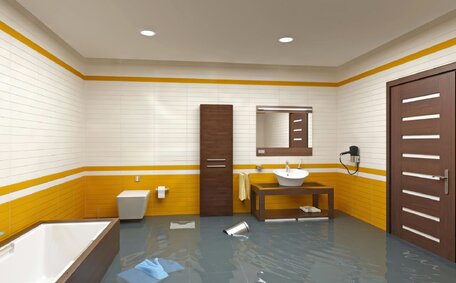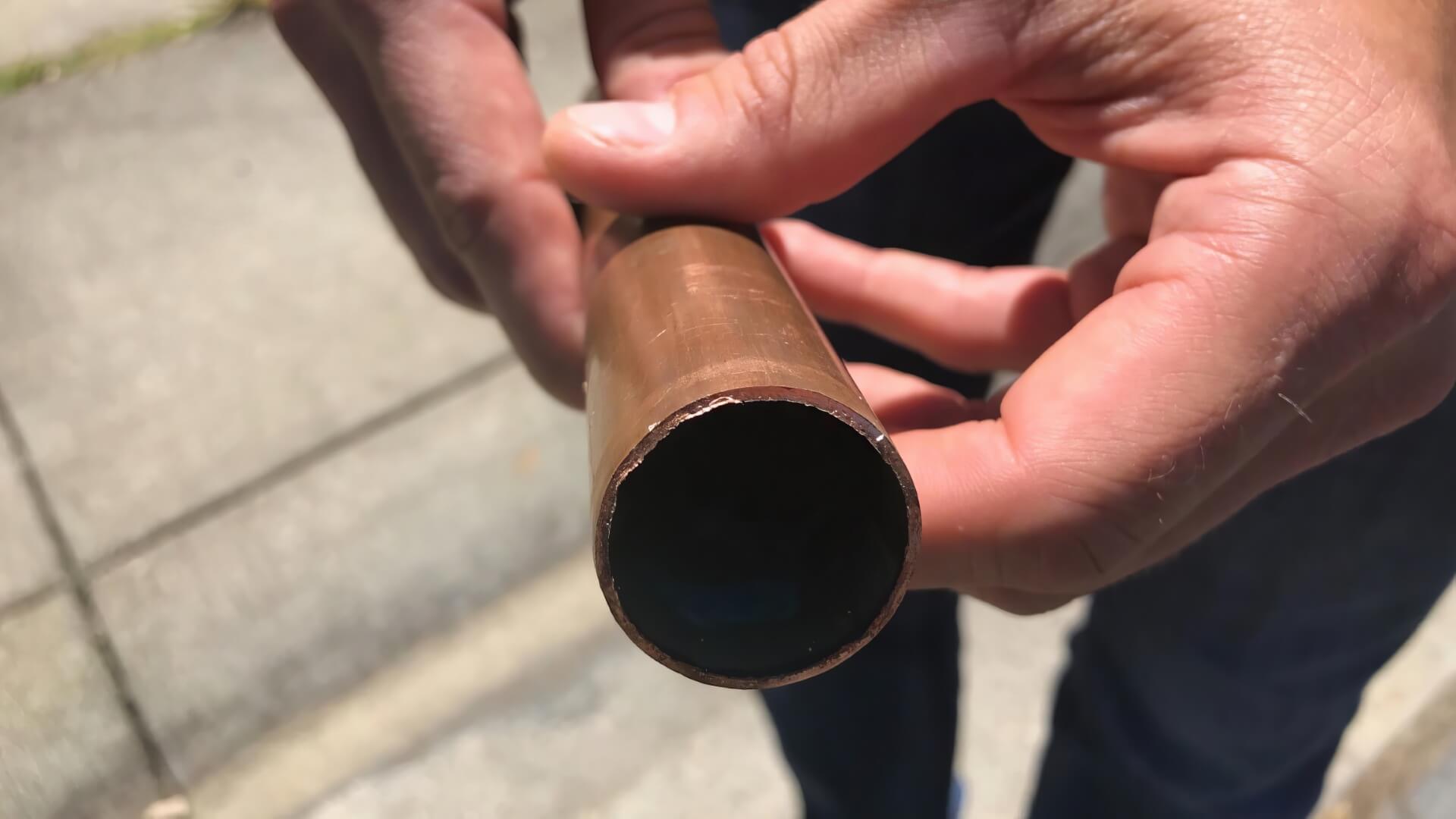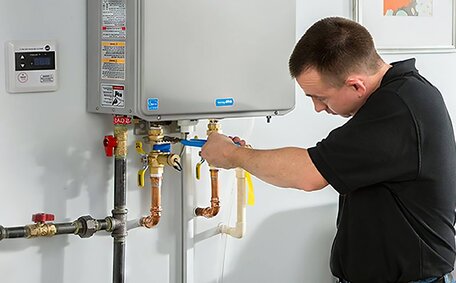
Signs Your Hot Water System Is Failing
Common signs your hot water system is failing include strange noises, rust, leaks, inconsistent temperature and pressure. Call our licensed plumbers if you notice these issues for repairs.
Read MoreClearing a blocked kitchen sink may seem like a straightforward DIY task, but there are critical legal considerations homeowners should remember. Performing illegal plumbing work can incur fines or prosecution, so it’s critical to discern what can and can’t be done yourself regarding drain repairs.
The Plumbing and Drainage Act NSW 2011, influenced by Consumer Affairs Victoria standards, clearly defines which plumbing activities require a licensed professional and which you can undertake yourself. While minor cleaning tasks are allowed, Operating mechanical equipment or applying chemicals demands specific training and certification to guarantee the work’s safety. Renters also have constrained rights, necessitating consent from the rental provider or rental provider agent to address clogged drains or other repairs.
This article clarifies the legal perimeters for DIY drain repairs, guiding you to comply with regulations and understand when to engage a local, fully licensed professional.
Homeowners can manage certain plumbing maintenance tasks themselves, adhering to Australian regulations:
In cases exceeding simple fixes, knowing the cost for professional blockage removal is crucial, often prompting contact with a local plumber. Using mechanical drain clearing tools like hydro jet systems, or hazardous drain cleaning chemicals without appropriate certification and licensing can lead to complications. As rental property owners, it’s imperative to commission qualified professionals for major plumbing works like snaking drains, hydro-jetting, pipe relining or drainage excavation.
In the dynamic between real estate agent, landlord, and tenant, Tenants with constrained DIY rights must inform landlords or their representatives before embarking on any repairs in rental properties, as communication is essential. Failing to hire licensed plumbers for complex issues may breach tenancy agreements and lead to financial consequences, with potential scrutiny from Consumer Affairs Victoria.
When confronting minor troubles like a blocked sink or bath drain, there are safe DIY approaches to clearing the way and work your plumbing yourself might attempt prior to involving a plumber:
Safety, along with adherence to Consumer Affairs guidelines, should be your primary concern when undertaking DIY drain cleaning. It’s vital not to use aggressive drain cleaners with your hands down the drain or introduce harsh items like wet wipes, which carry the potential to gravely damage your pipes. It’s also critical to check your tenancy agreement before attempting repairs yourself.
If DIY methods fail to resolve the clog and you find your drain still blocked, a plumber can be called to clear blocked drain issues efficiently. Continuing to overlook issues concerning your rental’s blocked drains can lead to backups and water damage, making it critical to resolve them as soon as possible. Calling out a plumber from our team of fully licensed plumbing services professionals ensures expertise and advanced techniques that reflect the cost to clear a blocked drain safely and effectively.
While you can often address minor blocked drain issues with DIY methods, more involved repairs necessitate professional equipment and licensed plumbers, as specified by Australian regulations.
Illegal DIY practices include the use of mechanical drain augers, high-pressure water jets, and pipe relining techniques without necessary certification. Homeowners who attempt major repairs risk fines, prosecution and serious plumbing system damage.
Qualified technicians are needed for complex plumbing issues such as extensive root infestations, collapsed or broken pipes, chronic blockages, or significant drainage system disruptions. Our licensed team utilises advanced drain camera technology to accurately diagnose and resolve the blockage our clients encounter with methods like hydro jetting, pipe bursting, and trenchless relining.
In rental premises, it falls upon landlords to organise a licensed plumber fix and safely resolve complex plumbing drainage dilemmas. Tenants should never attempt major repairs themselves as this can violate rental agreements and should inquire with their landlord to do repairs professionally. Contact your agent immediately if serious issues arise.
While simple DIY drain cleaning has a place, some jobs demand a higher level of expertise and equipment. Don’t take risks by overestimating your own plumbing abilities - leave major repairs to our fully certified professionals instead.
Both landlords and tenants have significant responsibilities in maintaining the plumbing systems of rental properties.
Prior to new tenants moving in, landlords and agents must ensure that all maintenance and repairs are compliant, fulfilling their role as property custodians.
Residential tenancies legislation dictates landlords bear the cost of urgent or critical repairs, taking into account factors such as property age and rent amount. Issues deemed non-urgent, yet could impact rent, should be recorded for subsequent maintenance.
A tenant must take care not to intentionally damage plumbing systems. It’s prudent to report minor problems to your landlord early before they worsen and to avoid the urge to do DIY plumbing unless the tenancy agreement permits.
By working cooperatively, landlords and tenants can maintain happy, hassle-free tenancies and keep properties safe through proper plumbing care and maintenance.
It’s essential to differentiate between plumbing issues requiring immediate action and those suitable for deferred maintenance.
Urgent plumbing repairs presenting health and safety hazards or critical appliance breakdowns demand immediate attention from a licensed professional. Noteworthy examples include burst water pipes influencing water pressure, sewerage leaks, blocked sewer drains, and serious hot water system malfunctions, where specialised advice advocacy services may be warranted.
The consequences of delaying urgent repairs can take a severe toll, leading to water damage, electrical fires, flood risks, and unsanitary conditions. Should such pressing issues emerge, tenants are urged to immediately inform their agents or landlords, who can engage their advocacy service to facilitate the prompt dispatch of licensed plumbers.
Non-urgent problems like dripping taps, minor drainage blockages or cosmetic fixtures issues may not require emergency assistance. Landlords and property managers are obliged to reasonably maintain appliances and plumbing systems throughout tenancies.
Seemingly minor plumbing issues, if overlooked, can escalate into substantial blockages due to cumulative damage over time. Landlords and tenants should work together to promptly address minor repairs, maintaining open dialogue regarding maintenance requirements.
In rental situations, clearly determining if an issue is urgent or non-urgent as per property legislation can help ensure appropriate response times and avoid disputes. If you have questions, don’t hesitate to reach out for obligation-free advice and quotes - we’re ready to address your concerns.
Tenants can apply to sometimes legally commission their own urgent plumbing repairs if landlords fail to respond promptly, then seek reimbursement for costs incurred.
Tenants must typically meet the following criteria to qualify for reimbursement:
Landlords may dismiss reimbursement claims if tenants fail to formally alert them of urgent problems or engage unlicensed tradespeople. Proper protocols must be followed.
In non-urgent scenarios, tenants should avoid commissioning jobs without consent and instead continue reporting maintenance needs to agents and landlords directly.
Qualified technicians are required to issue official compliance certificates to homeowners or landlords upon completing certain plumbing tasks.
These certificates verify that works meet all required Australian plumbing safety standards and regulations. They also provide warranties and facilitate insurance claims if faults arise.
Examples of plumbing tasks needing compliance paperwork include:
Using only licenced, insured and certified plumbers for such jobs ensures you receive these critical compliance certificates. Never attempt complex plumbing tasks yourself without proper qualifications.
Compliance paperwork gives vital peace of mind that works satisfy safety codes, while also enabling consumer protections under Australian consumer law if issues emerge. Don’t compromise safety; employing a licenced expert is best practice.
Undertaking plumbing tasks without the requisite qualifications or licensing can lead to significant consequences in the event of a mishap. DIY drain repairs that don’t meet Australian standards may void home insurance policies if up plumbing codes and regulations damage occurs.
Insurers require compliance certificates from licenced professionals as proof that works satisfy codes and laws. Non-compliant DIY repairs often lack this paperwork, making it difficult to find out how it jeopardises the validity of claims.
Examples include:
The onus falls on homeowners to prove DIY works didn’t contribute to subsequent insurance claims. Without certificates, insurers may deny liability, leaving owners unprotected from major loss and repair costs.
The risks are not worth taking. Protect your property and peace of mind by using qualified tradespeople for anything beyond basic maintenance.
When a complex blocked drain or other major plumbing issue arises, it’s crucial to hire a qualified, licenced professional plumber to handle the job safely and correctly.
Here are suggestions for sourcing a reputable plumber to clear your blocked drains:
Investing time to engage trustworthy plumbers safeguards your safety, property, and finances. Avoiding injury or property damage offers a financial reprieve far outweighing the additional costs of hiring experienced professionals.
It’s tempting to keep trying DIY methods when facing a blocked drain, but there are clear warning signs a serious issue requires professional equipment and expertise:
If DIY efforts fail to locate and clear a blockage, further attempts could worsen pipe damage. Persistent drainage problems also pose health risks from mould and bacteria, compelling resolution as soon as possible. At the first indication of a mounting problem, reach out to our team of specialised drain plumbers to meticulously identify the root cause and address it promptly.
When weighing up DIY versus professional drain clearing, it’s important to analyse both the short and long-term costs. In the moment, DIY methods may seem cheaper - however, the risks of exacerbating pipe damage or drainage issues can ultimately cost much more in repairs down the track.
Attempting makeshift chemical or mechanical DIY methods to clear a blocked drain can permanently harm pipes, particularly older earthenware systems. Botched snaking attempts can also crack drains or create new leak points. This damage may not be immediately visible but can cause chronic drainage problems and seepages over months or years before detection.
Understanding how much does it cost to clear severely damaged plumbing through excavation can surprise many, often surpassing $5,000-$10,000, and vastly outweighing any initial savings from DIY trial and error. Enlisting a fully licensed professional at costs of $150-$300 to accurately locate and clear a blockage typically proves more cost-efficient, forestalling surging repair expenses in the future.
There are also long-term benefits in using fully licenced plumbers. Their work typically comes with guarantees against defects and faults. You also gain the peace of mind that all safety standards, codes and regulations are satisfied - something DIY cannot ensure.
While simple snaking or boiling water methods have their place, complex drain issues warrant an expert plumber’s skills, equipment and experience. Protect yourself from expensive repairs and property damage to your drainage systems - call the professionals at first signs of trouble.
Common signs your hot water system is failing include strange noises, rust, leaks, inconsistent temperature and pressure. Call our licensed plumbers if you notice these issues for repairs.
Read MorePipe relining is an eco-friendly alternative to pipe replacement that uses materials like epoxy resin to repair pipes without digging. It produces less waste and emissions than traditional methods. Learn about the environmental benefits of trenchless pipe relining.
Read MoreReplacing an outdated electric, gas or solar hot water system with a more efficient heat pump or solar model can significantly reduce your energy bills and carbon footprint. Take advantage of available rebates. Contact us to retrofit your old system today.
Read MoreMarrickville, 2204 NSW
We will call back as soon as possible.




